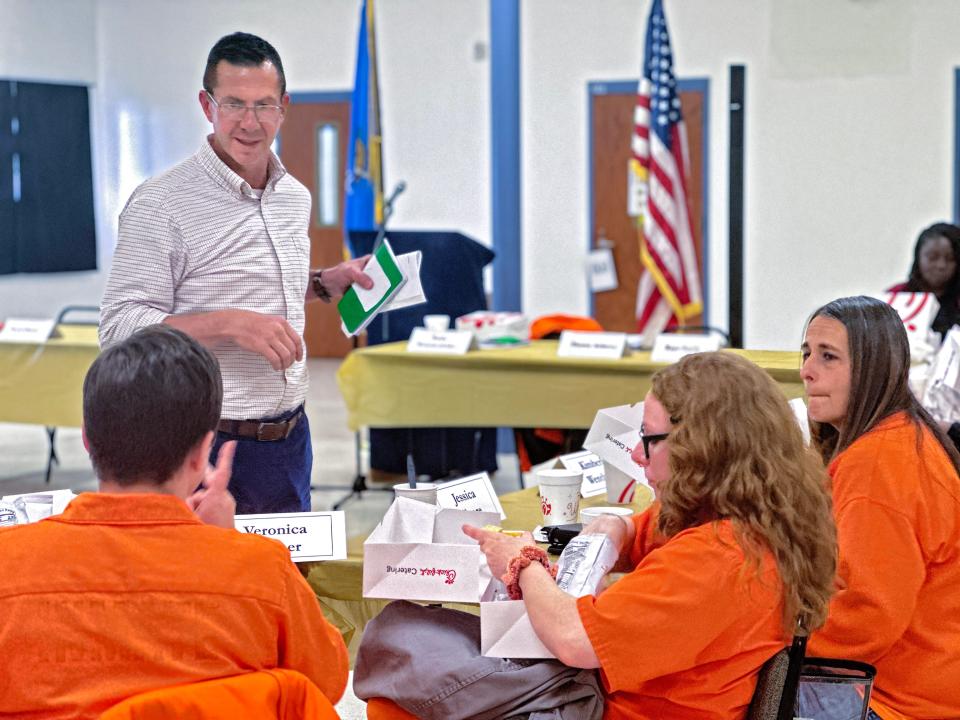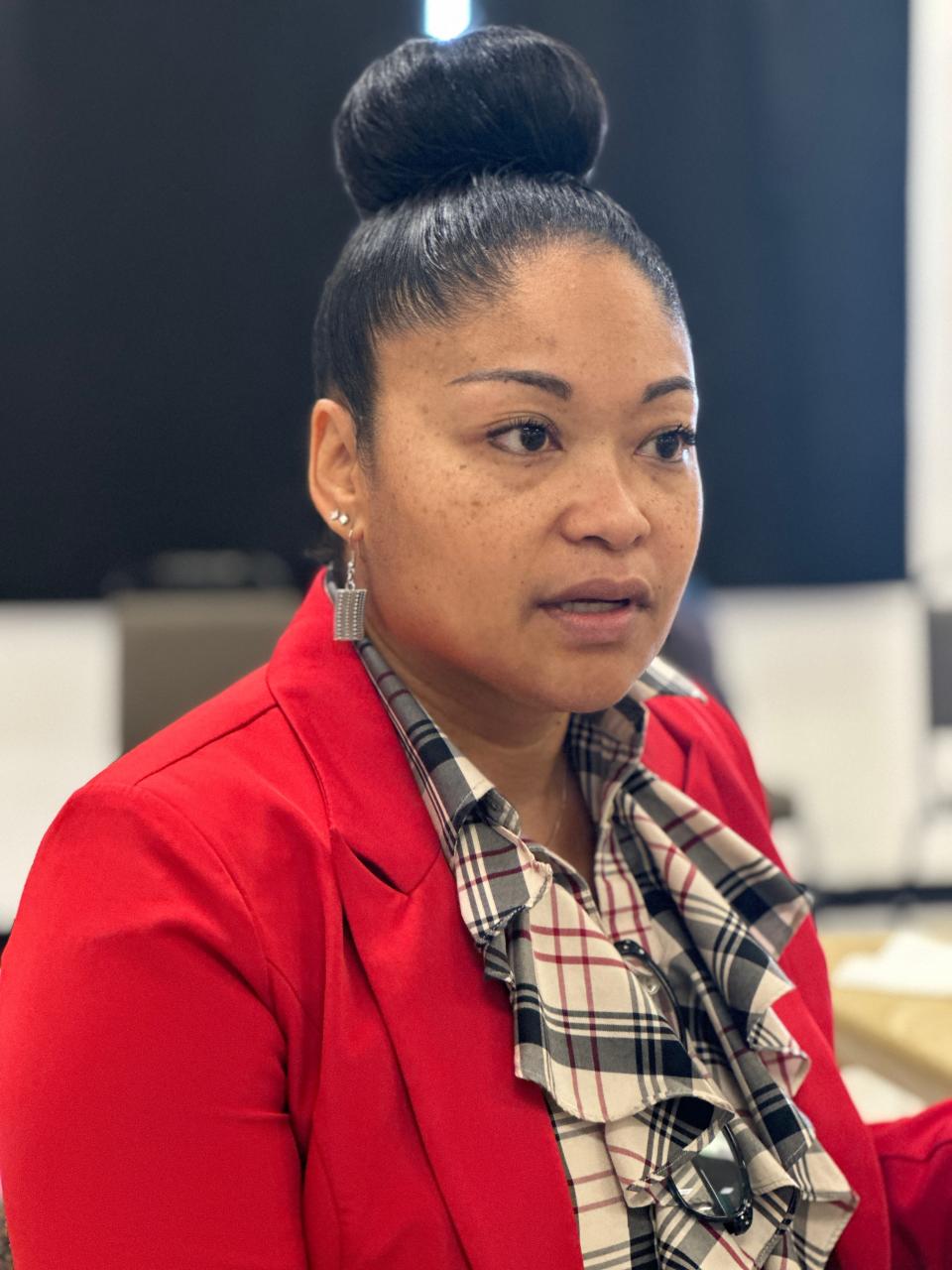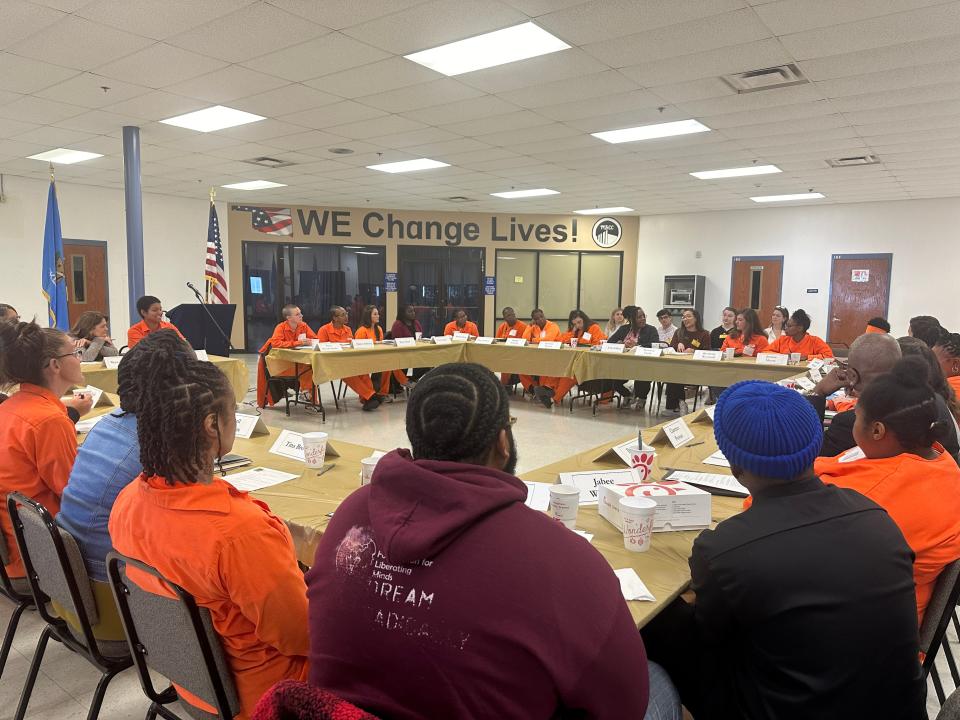Former Oklahoma House Speaker wants to go back to Square One on criminal justice
- Oops!Something went wrong.Please try again later.
McLOUD — Kris Steele keeps pushing a giant boulder up a huge mountain.
The boulder, however, is unwieldy, unforgiving and keeps getting bigger. Doesn't matter, though, because Steele won't quit. Even though success is painfully slow, he doesn't care. He’s been here before. Steele created the boulder — it's a metaphor for his efforts to change the criminal justice system in Oklahoma.
Once a politician, today Steele is the executive director of TEEM (The Education and Employment Ministry), a nonprofit that works to reduce the state's incarceration rate through education, workforce training and personal development. Reforming Oklahoma's criminal justice system has become Steele's life work. The effort, he said, has taken him from state representative to outspoken advocate.
And for the second time in less than a decade, he's pushing to change the system — this time, from the ground up.
His efforts go back to his tenure as speaker of the House of Representatives. Steele approached his role as a Republican speaker in a pragmatic way: He guided tort reform legislation through the House, eliminated social promotion in public schools and restricted the ability of teachers to appeal their terminations to district courts.
He also took his first, tentative steps toward criminal justice reform in Oklahoma.

As speaker, Steele helped pass corrections legislation that expanded the number of low-risk, nonviolent inmates eligible for community sentencing and electronic monitoring programs. Though his effort was successful, there was more pushback than expected from the GOP's more conservative wing.
Two years later, after he had termed out of office in 2014, Steele joined TEEM. There, he found his voice. He took his conservative credentials out for a second spin, joining forces with the Oklahoma branch of the American Civil Liberties Union to push two state questions on criminal justice reform: State Questions 780 and 781.
State Question 780 reclassified many nonviolent drug crimes as misdemeanors. Steele and others promoted the proposal as a way save the prison system money by reducing the number and length of incarcerations for nonviolent offenders.
Question 781 was supposed to redistribute the money saved by the reduced prison costs to Oklahoma's 77 counties to fund the rehabilitation of criminals.
Both proposals passed. Gov. Kevin Stitt — the state's new Republican governor ― signed legislation by Rep. Jon Echols and Sen. Kim David which implemented the largest mass commutation in history. In 2019, the state released 527 nonviolent offenders. Steele estimated the release would save the state $12 million a year in prison costs.
“Historically, many in Oklahoma have seen incarceration and excessive penalties as politically expedient,” Steele said at the time. “We are breaking away from that model as we understand that not only does it make a situation worse, but it also costs a fortune.”
Steele also targeted the death penalty. He served on the 11-member Death Penalty Review Commission. In 2017, the commission issued a scathing, 270-page report that recommended the state continue its moratorium on the death penalty "until significant reforms are accomplished."
"Many Oklahomans support the availability of the death penalty as evidenced by the vote in favor of State Question 776 in the November 2016 election," the report said. "Nevertheless, it is undeniable that innocent people have been sentenced to death in Oklahoma. And the burden of wrongful convictions alone requires the systemic corrections recommended in this report."
For a brief moment, it looked like Oklahoma — which still has one of the highest incarceration rates in the nation — was truly changing its criminal justice system.
Then the effort stalled.
The Oklahoma Legislature didn't begin to fund SQ 781 until this year and, since then, state lawmakers walked back several reforms made by SQ 780. In addition, the death penalty remains alive and well.
And it was at that point that Kris Steele learned a valuable lesson: the difference between passing state questions on criminal justice reform and actually implementing criminal justice reform in Oklahoma.
Seeking input from those who are incarcerated
The Mabel Bassett Correctional Center sits on several acres just outside of McLoud ― a 45-minute trip, east of Oklahoma City. Like the rest of the state’s prisons, it’s a large, nondescript building surrounded by razor wire and people with guns. The facility is home to 1,218 women.
It’s also a place Steele visits regularly. He directs and encourages and cajoles and talks. Mabel Bassett, he said, is ground zero in criminal justice reform. It's the perfect spot to find out just how the criminal justice system functions and to have an honest, open conversation about how the system works.
"We want to talk to people who have lived the experience," Steele said. "We are seeking to listen, understand and validate. We want to take that information and identify a more sustainable and effective approach to reducing crime in Oklahoma."
To do that, Kris Steele and TEEM partnered with Columbia Justice Lab, a Columbia University research center, on the university's Square One project. The partnership, Steele said, put him in contact with some of the best minds in the country and gave him the opportunity to see what other states were doing and to draw from that experience.
"Columbia is helping us understand," he said, "to connect the dots."
In late November, the Square One project held an all-day "conversation" at Mabel Bassett. There, about 40 women, representatives of TEEM, Columbia University and the Sarkeys Foundation came together to talk about criminal justice, racism, faith and life behind bars.
The meeting inside the facility was the first time the Square One project had gone into a correctional facility to seek input from those who were incarcerated, said Anamika Dwivedi, the director of local partnerships for the Square One project.
"We are trying to create conversations," she said. "And including those who are incarcerated is very important. The people who have been deeply involved in violence have a story to tell about how they got there."
One of those voices came from Tyalea Britt, who is incarcerated at Mabel Bassett. For Britt, changing the criminal justice system means understanding the background of those incarcerated. "You have to look at the background to understand the person," she said. "It is a part of the whole."
Dwivedi said messages like Britt's are vital to the project. "We want to hear and understand everyone," she said. Once the project is complete, Dwivedi said the project will issue a report, but the larger goal is for "people to engage in these dialogues in more equitable ways."
"We want the discussion," she said. "No matter what color you wear when you are at the table."
Tamika White, the warden of Mabel Bassett, agreed. White, who has more than 20 years experience in corrections, joined the facility in 2021 as a deputy warden. She took over as warden in March. And while she is all about following policy and ensuring the facility functions as it should, White said there is room to improve the criminal justice system, but changing things, she said, will take more than just words.

"If not now, when," she said. "We need to put action behind the words. This is an opportunity we are not taking lightly."
A good start, one expert said, is through education.
Laynie Gottsch, a program officer at the Sarkeys Foundation, said educating those who are incarcerated is key to making serious, long-term improvements in criminal justice reform. Gottsch said Sarkeys has funded more than 30 scholarships for college classes at Mabel Bassett. The program began in fall 2021 with a grant of $50,000. Since then, she said, the foundation has added another $60,000.
The results, she said, are dramatic.
"Women who take and pass college classes are much less likely to return to prison," she said.
A study by the Rand Corporation supports this. Published in 2016, the Rand study said educational programs reduced recidivism and prison costs.
"Inmates who participate in any kind of educational program behind bars — from remedial math to vocational auto shop to college-level courses — are up to 43 percent less likely to reoffend and return to prison," the study found. "They also appear to be far more likely to find a job after their release, and the social stability that comes with it. Every dollar invested in correctional education saves nearly five in reincarceration costs over three years."
According to the study: "Every year, more than 700,000 state and federal prisoners are released back into their communities, often with no greater life skills than they had when they went in. The result: Around 40 percent of them commit new crimes or violate their parole, and find themselves back behind bars within three years of walking free."
Offering educational opportunities to those who are incarcerated, the study said, breaks that cycle.
Gottsch said the state-Sarkeys partnership includes several colleges including Rose State College, Oklahoma Baptist University and Oklahoma Christian University. "It's successful," she said. "The women love it and its changing lives."

Still pushing for change in the criminal justice system
For Steele though, the one step forward, two steps back approach to corrections policy is beyond frustrating. It's expensive, he said, and it's not effective.
Take for example, commutation.
It was just four years ago that Gov. Stitt commuted the sentences of more than 500 prisoners. Currently, commutation guidelines give most prisoners the opportunity to seek commutation at any time ― though there's a three-year waiting period if the application is denied.
However, one new proposal would change that.
Under an administrative rule change proposed by the Oklahoma Pardon and Parole Board, new criteria for commutation would include: the sentencing range for one or more of a prisoner's current offenses has been changed by the Legislature; the prisoner doesn't have a project release date and has served at least 30 years; the prisoner has a favorable recommendation from a trial official, such as a DA or a judge; or the prisoner has a favorable recommendation from the governor.
Supporters of the proposal said the changes would eliminate applications with no merit, but opponents call the restrictions a major blow to thousands of state prisoners who use commutation as a motivation to stay productive and stay out of trouble.
"This has real-life consequences for these people," Morgan Hale, the managing attorney at Project Commutation, told Oklahoma Watch. Based in Tulsa, Project Commutation represents inmates who say their sentences were excessive.
Steele said those types of sentences do more harm than good. "They aren't effective and they're expensive," he said. "We, as a state, tend to incarcerate people we're mad at and not that we're afraid of."
Changing the criminal justice system, he said, has to include everyone. "It can't just be about one area. We have to look at every avenue. We have to address the victims of crime, too. Part of that conversation has to be about how do we make them whole or as much as possible. That's part of the conversation about restorative justice."
To get there, Steele is willing to take the long-term approach.
"I know this isn't something that is going to change overnight," he said. "But we want to hear and learn. I really believe that Oklahomans want a restorative criminal justice system. They're not looking for retribution. I believe they want to do the right thing."
It's that belief, he said, they keeps him going.
One boulder at a time.
This article originally appeared on Oklahoman: Steele wants to rebuild criminal justice system from Square One

